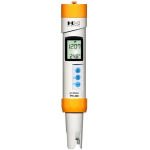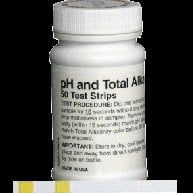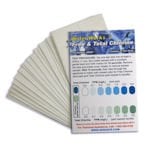TeddyGurl recently asked,
I want to know more about the water parameter tests such as turbidity, pH, chlorine, and calcium.
What is the common testing method that should be done?
Thank you for your question TeddyGurl. We will address each part of your inquiry separately.
Turbidity refers to the level of cloudiness or haziness in a liquid caused by concentrations of small particles, also known as suspended solids. The higher the concentration of these particles, the greater the turbidity of the liquid and more cloudy it appears.
To measure turbidity, one typically uses a meter of some sort. The eXact Water Testing Meter has a detection range of 3 to 580 NTU.
For the record, water with a turbidity reading of around 500 NTU will appear milky to the naked eye and water with a turbidity reading of around 50 NTU will appear cloudy, but still allow light to pass through.
pH refers to the measure of how acidic or basic a solution is. Its scale runs from 0.0 to 14.0 with 7.0 as its neutral (not acidic and not basic) value. Solutions with pH values greater than 7.0 get labeled as basic and solutions with pH values less than 7.0 get labeled as acidic.
To measure pH, one has several options: liquid/powder/tablet based test kits, test strips and electronic meters.
Chlorine gets added to drinking water as a disinfectant (an antimicrobial agent used on non-living objects to eradicate and destroy microorganisms which can cause infection). The United States Environmental Agency has set the Maximum Contaminant Level (MCL) for chlorine at 4.0 ppm (parts per million), or 4.0 mg/L (milligrams per liter).
When testing for chlorine in water, one can choose between liquid/powder/tablet based test kits, test strips and electronic meters.
Calcium has the atomic number of 20 and ranks as the fifth most abundant element in the Earth’s crust. When it comes to drinking water, calcium acts to ‘harden’ the water and so therefore when one measures the hardness of water, one actually measures the calcium (and magnesium to a lesser extent) concentration in the water.
To measure the calcium content in water, one can choose between liquid/powder/tablet based test kits, test strips and electronic meters.











